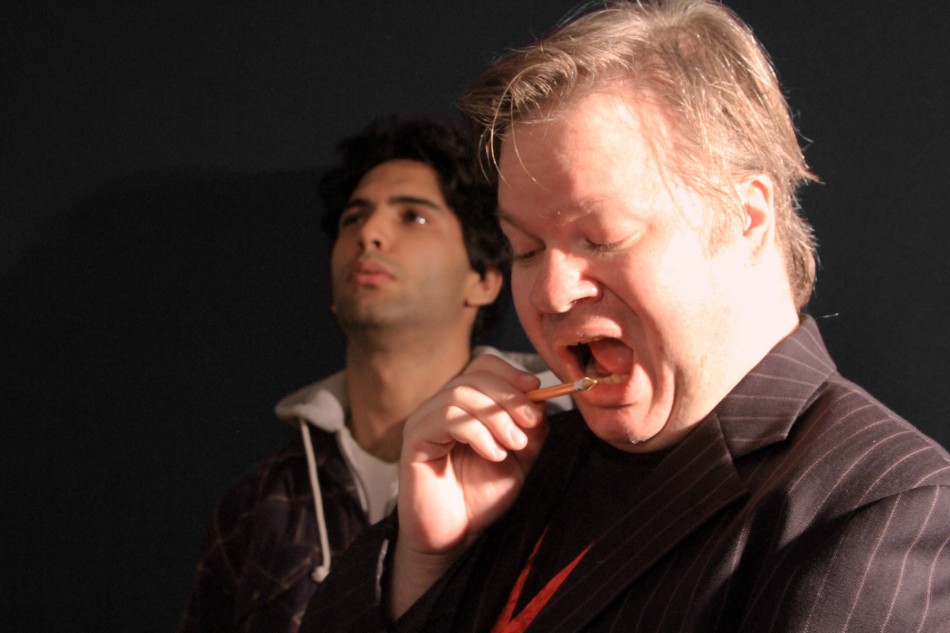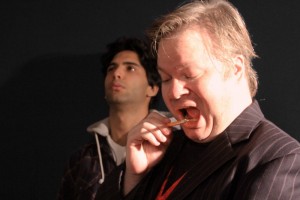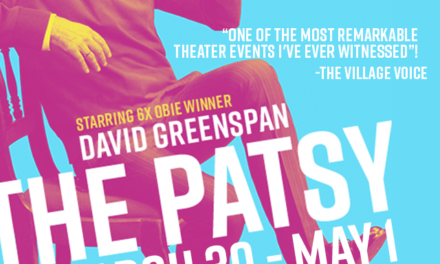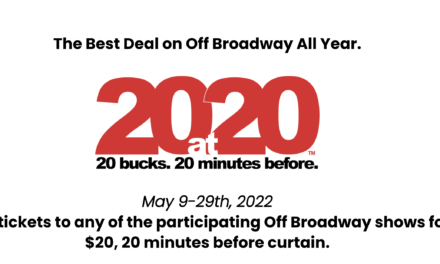A play on power.
By Jordan Cohen
The absurdist two-hander Virtual Reality, by Alan Arkin, first appeared in 1998 as part of an evening of one-acts by Arkin and Elaine May, appropriately titled “Power Plays.” Arkin, a superb Oscar-winning actor, honed his skills in the early 1960s with the Second City improv troupe in Chicago, and in his memoir, An Improvised Life, describes the lasting influence of improvisation on both his life and art. In Virtual Reality, seen in revival at the Midtown International Theatre Festival, directed by Emily Edwards, Arkin seems to apply to his playwriting what he has learned as an improviser about power as it relates to the imagination and social relationships. By inserting abstract characters into thoughtfully inexplicable circumstances, Arkin skillfully allows the underlying themes of his piece to emerge: the subtle (and not so subtle) ways in which fluctuating power dynamics shape our social interactions, and the extraordinary power the mind can have over our perceptions of what is real and, indeed, what is purely imaginary.
The play centers on Lefty (Aman Soni) and DeRecha (Josh Hartung), who are meeting for the first time in a mysterious and unidentified location. After Lefty fails to produce an ID, DeRecha grills him on his identity and credentials in menacingly Pinteresque fashion. Soon, we learn that DeRecha has hired Lefty to assemble and utilize several objects that are to be delivered in crates. Apparently, DeRecha has chosen Lefty from a database of workers that specialize in the service DeRecha requires; however, Lefty feels ill suited for the job. The exact purpose of the job remains nebulous, at least until the last fifteen minutes of the play.
Despite Lefty’s protestations, DeRecha convinces him to take part in a dry run – the pair pretends the crates have arrived and Lefty pantomimes assembling/using the items, while DeRecha mimes checking off each item from an imaginary waybill. At first, only DeRecha is invested in this make-believe, to the point where he seems to see each item clearly before him, much to Lefty’s consternation. But soon, Lefty catches on, and both men see the invisible objects, clear as day, even though nothing has been delivered. And these items – a first-aid kit, roller skates, gas masks, among others – not there yet intensely real to both, threaten to draw them into a world they aren’t prepared to encounter. But is the power real or of their own creation? Vague, I know, but revealing more would give away the chilling climax.
The oscillating power dynamic between the characters allows Arkin to explore the ways in which hierarchical relationships manifest and play out moment to moment. Often, Lefty expresses frustration about the job, complaining that he is confused, a “lone wolf,” and used to following his own patterns. DeRecha pounces on these opportunities to express authority over the younger man, calling him an outcast from society and unfit to “live within a structure.” At other times, however, DeRecha’s self-assuredness melts away and Lefty seems to take the upper hand. In an intriguing, albeit perplexing moment toward the beginning, DeRecha looses his thoughts midsentence and pauses, permitting Lefty the power to initiate a replay of the previous action. The two walk out, return again, and start the scene anew. Toward the end, power changes hands often and abruptly as the pair struggle against their suddenly ominous lot.
The production’s strength lies mainly in Arkin’s script: not only the ways in which he expresses his themes, but also his adroitness with tone and plot development. Arkin discloses just enough information at perfect moments to keep the audience engaged and wanting to learn more, and the first half’s comic absurdity transitions easily to a darker vision toward the end.
Mr. Soni and Mr. Hartung mainly fulfill the requirements of their roles, although both resort too much to shouting or overly emphatic declaration. At the end, when the stakes intensify, both actors deliver convincing emotional and physical performances sure to make your heart race. Special mention should be given to the sound and lighting design, which together become a character all its own in the final minutes of the play. But again, I’ll stop myself before I say too much.
Virtual Reality delivers an intriguing message about power – the power we have over ourselves and others, the power of our imaginations, and what happens when power gets away from us. While the performances could have been sturdier, the play itself provides plenty of intriguing ideas to make for a satisfying night at the theater.
Virtual Reality (One last performance: Sunday, 11/22 at 6:45pm)
Midtown International Theatre Festival/Jewel Box Theatre
312 W. 36th Street, between 8th and 9th Avenues, New York, NY
For tickets, visit https://web.ovationtix.com/trs/pe.c/10047561 or purchase at the door.























